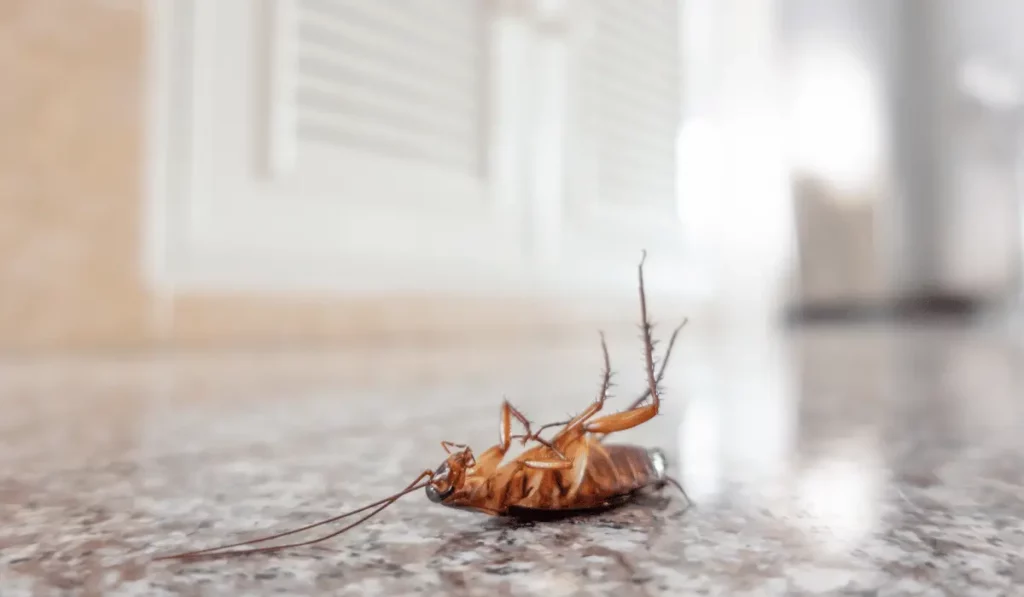Myth Debunker: Do Cockroaches Lay Eggs When Killed?
Let’s dispel a persistent myth about cockroaches: do they lay eggs when killed? This commonly heard notion may make you hesitate when encountering a roach in your kitchen. But is there any truth to it?
In this blog post, we’ll discuss the truth of this myth and provide valuable tips for preventing cockroach infestations as well.
Key Takeaways
- Killing a cockroach does NOT result in egg release. Many mistakenly believe that squashing a cockroach will lead to a larger infestation.
- Look for an ootheca, a firm egg case protruding from the female cockroach’s abdomen. This indicates pregnancy in the cockroach.
- Maintain cleanliness, seal potential entry points, regularly inspect, and use roach baits and traps to prevent home invasion by cockroaches.
- Identify the species, prepare your home for extermination, undergo pest control treatment, and follow up with treatments when combatting infestations.
– – –
🪳 Get cockroach control in Sacramento County or San Diego County
Cockroach infestations will not go away on their own
Contact Us Now To Get Rid Of Them
– – –
Do Cockroaches Lay Eggs When They Die?

The short answer is “no.” Cockroaches do not lay eggs or unleash baby roaches when killed. A common misunderstanding is that squishing a cockroach will release its eggs, leading to a bigger infestation.
However, the truth is quite different. Female cockroaches carry their ootheca, a protective casing that holds the eggs, until just before they hatch. The ootheca is usually deposited in a safe, hidden location.
So, while it’s understandable to worry about contributing to the roach problem in your home, rest assured that squashing them won’t cause an explosion in the population.
Cockroach Prevention
Prevention is always more effective than dealing with an existing infestation. Ensure you’re actually dealing with cockroaches, then follow these steps to deter them from invading your home:
- Ensure a Clean Environment: Cockroaches are attracted to food and water sources. Regularly clean your kitchen, bathroom, and dining area, ensuring you do not leave any food particles or standing water. Regularly take out the trash and ensure that your bins are adequately sealed.
- Seal Entry Points: Cockroaches can enter your home through small gaps in doors, windows, and walls. Check for any potential entry points and seal them using caulking or other suitable material. Pay special attention to areas where pipes or wires enter the building.
- Regular Inspections: Inspect dark, hidden areas under the sink, behind appliances, and in basements or attics. Cockroaches prefer such locations to lay their eggs.
- Use Roach Baits and Traps: Strategically place roach baits and traps in areas where you have noticed cockroach activity. These can help control a small-scale infestation and give you an indication of where the roaches are coming from.
These DIY tips can help prevent a cockroach problem. However, what if you’ve discovered an infestation? Prevention won’t be enough at that point. You’ll need to go a step further.
– – –
🪳 Get cockroach control in Sacramento County or San Diego County
Cockroach infestations will not go away on their own
Contact Us Now To Get Rid Of Them
– – –
Cockroach Infestation? Here’s What to Do
If you’re dealing with a cockroach infestation, don’t panic. There are several steps you can take to combat these pests effectively.
- Identify the Species: First, you must identify the cockroach species. Each species has different behaviors and preferences; knowing the type can help you strategize their removal. For example, German roaches prefer warm, humid areas like kitchens and bathrooms. In contrast, Oriental roaches prefer cooler, damp places like basements and drains.
- Prepare Your Home: Before treatment, you must prep your home by cleaning thoroughly to remove any food and water sources. Additionally, seal any cracks, crevices, and entry points around your home to prevent roaches from finding shelter and reproducing.
- Pest Control Treatment: Use natural methods like boric acid or diatomaceous earth for natural cockroach control. Or apply insecticides in areas where you’ve noticed roach activity. You can also use growth regulators (e.g., Hydroprene) to disrupt the roach’s life cycle, preventing it from reaching maturity or reproducing.
- Follow-Up: After the initial treatment, you must follow up to ensure the infestation is fully eradicated. This may involve additional treatments or adjustments to your original plan.
- Prevention: Once you’ve dealt with the infestation, take steps to prevent future problems. Continue with regular inspections, maintaining cleanliness, and sealing potential entry points.
Remember to always follow safety guidelines when using any pesticides or chemicals. If the infestation is large or the situation gets out of hand, it’s wise to seek help from a professional exterminator.
– – –
🪳 Get cockroach control in Sacramento County or San Diego County
Cockroach infestations will not go away on their own
Contact Us Now To Get Rid Of Them
– – –
When to Call a Pest Control Professional
While minor infestations can sometimes be handled with DIY methods, there are clear signs when it’s time to call in the professionals:
- Rapid Population Growth: If you see a significant increase in roach numbers in a short period, it’s time to call a professional. Roaches reproduce quickly, and a small issue can quickly become a large infestation.
- Persistent Infestation: If DIY methods haven’t solved the problem, it’s time to seek professional help. Professionals have access to powerful and effective treatments that can eliminate roaches for good.
- Health Concerns: Cockroaches can carry diseases and allergens that trigger asthma and allergies, especially in sensitive individuals. If you or a family member are experiencing health issues due to a roach infestation, it’s time to call the pros.
- Difficulty Locating the Nest: Roaches are skilled at hiding, especially since they are nocturnal. If you can’t find the nest to treat the problem at its source, a professional pest control expert can help.
Remember, waiting too long to handle an infestation can increase costs and potential health risks. If you’re dealing with persistent roaches or a large-scale infestation, don’t hesitate to call in a professional pest control service.



